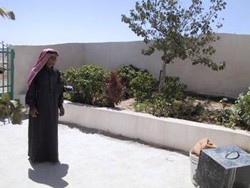
Initiative
USAID chose a community of 18 homes in East Shigera as the site of a comprehensive effort to rehabilitate the water and energy infrastructure promote water efficiency. After assessing their priorities, residents worked with USAID to rehabilitate the water network and extend it to each household. Households were then fitted with rooftop water harvesting systems, as well as a cistern for storing water and solar power systems for heating water. Water-saving devices were fixed in the taps and showers, and impermeable septic tanks were installed. Simple water treatment systems were also installed, and women were shown how to operate and maintain them.
Results
This effort was instrumental in saving water, reducing electricity costs and improving home values. Now that they have treated water available for gardening, residents can raise produce for their families or sell it at market, improving their income potential. Household improvements gave East Shigera's residents a sense of pride and ownership; in fact, residents were so committed to improving their community after the project that they donated land for a new park. The municipality provided swings and chairs for the park, as well as workers to help build it. Local residents planted trees that were donated by Jordan's Ministry of Agriculture.







Comment
Make a general inquiry or suggest an improvement.